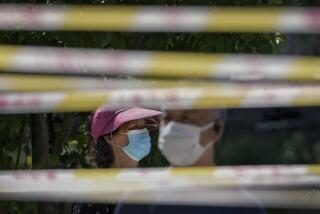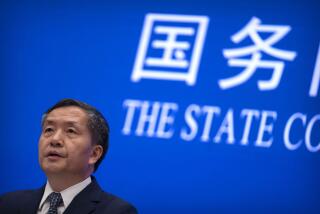Fearing Panic, China Remains Quiet About Mystery Illness
- Share via
BEIJING — A mysterious respiratory illness believed to have originated in southern China appears to have reached the capital this week. But you wouldn’t know it from the state-run media.
China’s silence is in sharp contrast to the World Health Organization, which last weekend called the unusual form of pneumonia a “worldwide health threat.” It also raises questions about the country’s ability to respond to what could become a health crisis.
Known as severe acute respiratory syndrome, the illness apparently broke out in November in southern China’s Guangdong province, then spread to Hong Kong and other parts of Asia. It is believed to have infected nearly 600 people on three continents, killing at least 14. Symptoms include high fever, coughing and difficulty breathing. Most victims are medical workers who had close contact with hospitalized patients in Guangdong and across the border in Hong Kong.
The Chinese media had been told not to report the story during the two-week National People’s Congress, the scene of the first orderly leadership transfer in more than 50 years of Communist rule.
Immediately after the congress ended Tuesday, the Chinese foreign ministry issued a short statement saying that the outbreak in southern China was under control. Yet a day later, unconfirmed reports suggest that the fast-moving disease already has struck Beijing, killing two people and possibly infecting many more.
“We heard that some cases [in Beijing] have been reported, some may even have died,” WHO’s representative to China, Henk Bekedam, said Thursday.
Officials at the Chinese health ministry and the Chinese Infectious Disease Control Center in Beijing said Thursday that they have no information and no plans for a news briefing. But Health Minister Zhang Wenkang continued to reassure WHO that China recognized the seriousness of the problem and has organized emergency treatment, according to the China Daily.
Officials did not go public with the possible epidemic until mid-February, when the spread of the disease in southern China supposedly passed its peak. By then it had already sickened more than 300 people and claimed five lives. Beijing waited until two weeks ago to seek help from WHO and didn’t share a full report on the illnesses until four months after the initial outbreak.
“The people’s right to know is a very extravagant concept for the average Chinese,” said Yang Fengchun, a professor at Beijing University. “The government has a tradition of withholding information and prefers to keep the masses ignorant. So it’s impossible for us to know the truth.”
WHO has since dispatched a team of medical professionals to China to investigate and plans to send more experts here this weekend.
Southern China’s dense population and warm climate make it a convenient incubator for contagious diseases. Fast and accurate access to information could help curb the spread of illness, especially in a coastal region with easy access to the rest of the country and abroad.
Despite China’s growing openness to the world through international trade and commerce, Beijing maintains an iron grip on the flow of information. Health news is considered politically sensitive because it can spread fear and undermine social stability.
“If China wants to be a world player they have to share information on something like this,” said David Zweig, a China expert at the Hong Kong University of Science and Technology. “The earlier the better.”
The decision not to provide information has triggered an outpouring from underground news outlets. E-mails and cell phone messages have been inundating the public with unverifiable updates and warnings that could be more destabilizing.
Even delegates to the People’s Congress were concerned enough to petition the government to set up a disaster response system to efficiently deliver reliable information.
Medical staffers who answered the phone at two major hospitals in Beijing said that they have not heard about WHO’s global warning and that they have not been told to take extra precautions.
“It is scary,” said a People’s Hospital nurse. “There are lots of rumors out there. You can’t believe everything you hear.”
More to Read
Sign up for Essential California
The most important California stories and recommendations in your inbox every morning.
You may occasionally receive promotional content from the Los Angeles Times.










